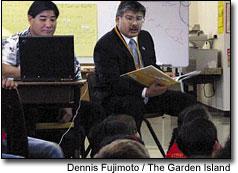Residents of Kekaha are on the right track in taking back their neighborhoods from criminals, said U.S. Attorney Edward H. “Ed” Kubo, Jr. Speaking for organizers of Waele A Ola Hou programs (weed-and-seed, anti-drug efforts) around the island at the
Residents of Kekaha are on the right track in taking back their neighborhoods from criminals, said U.S. Attorney Edward H. “Ed” Kubo, Jr.
Speaking for organizers of Waele A Ola Hou programs (weed-and-seed, anti-drug efforts) around the island at the Kaua’i War Memorial Convention Hall in Lihu’e, he said efforts O’ahu citizens have initiated that have worked to reduce crime will work on Kaua’i as well.
Kubo pointed out that collaboration among members of various segments of the community, being attuned to what’s happening in the neighborhood, and reporting unusual activities, as well as seeking funding opportunities for prevention projects, are all factors that contribute to success in Weed and Seed programs.
Although O’ahu was the first island to implement the U.S. Justice Department’s Weed and Seed strategy, Kaua’i residents organized a similar anti-drug program, Waele A Ola Hou, in less than half the time.
“I applaud you for your efforts,” Kubo said.
Kekaha and Hanama’ulu residents, along with Mayor Bryan J. Baptiste, representatives from the Kaua’i Police Department, the county’s anti-drug office and other county departments, attended the meeting to pick up pointers on how they can beef up efforts in their ongoing war on illegal drug use.
Kubo shared success stories about things happening on O’ahu, and offered suggestions on strategies that could be utilized on Kaua’i.
Kekaha residents, in turn, talked about their efforts since the county-sponsored Waele A Ola Hou program
was launched this summer.
Over the course of a few months, Beverley Pang, community-outreach specialist for the county’s anti-drug office, spoke to members of three Ka Leo O Kaua’i groups who were identified as living in communities that could really benefit from a Weed and seed like program, Hanama’ulu, Kekaha and Kilauea.
According to Pang, Kekaha residents were very receptive to starting an anti-drug program, so Waele A Ola Hou began in that community. Hanama’ulu residents are in the early stages of organizing the program for their area, and Kilauea towns-people are exploring how it might work in their community, said Pang.
On O’ahu, Kubo noted that actions by members of a local Weed and Seed group played a major role in the dramatic reduction of numbers of burglaries in the Ewa Beach community.
When a rash of burglaries was occurring in the area earlier this year, Leeward O’ahu Weed and Seed group members discussed what they could do to keep this from continuing. Police officers in the group decided to step up their efforts to curb truancy, optimistic that this strategy would alleviate the problem.
“They did a truancy sweep for two weeks, and every day the officers picked up fewer students than the day before,” said Kubo.
Burglary rates decreased, and officials at Campbell High School (a school in Ewa Beach) received an award for having a sharp decline in truancy rates at their school, he added.
Another Weed and Seed group in Windward O’ahu took matters into their own hands when they saw that drug deals were happening around shrubbery near a local church.
“They chopped down the bushes and the problem went away,” Kubo said.
In developing a Neighborhood Watch program, Kubo suggested that, rather than having a group of people marching around the neighborhood, which tends to fizzle after awhile, it would be advisable for anyone who notices unusual vehicles or people in their neighborhood to simply jot down the license plates and a description of the people.
“This way, if a crime is committed, police will have something to go on,” he explained.
Other ideas that Kubo shared included his intention to organize a group of community police officers, assign a prosecutor, as well as provide Neighborhood Watch training for Kekaha residents.
He also encouraged those in attendance to partner with leaders of other organizations who have the same goals as they do, citing churches as organizations whose leaders designate some of their money for drug-prevention programs.
Kekaha residents enthusiasti-doing to resolve a problem in their community.
Julie Kajiwara, president of the newly formed West Kaua’i Community Association, reported that a number of individuals have been using the former Kekaha Sugar Company mill as a shelter, and teenagers have been spotted hanging out there during the day. This presents safety issues as well as the concern for other illegal activities taking place, she noted.
“They’re already trespassing,” said Kajiwara.
In discussing this situation, she said members of the community association decided on several strategies, and have already completed some of them. One of the first things the group members did was put in a request for more street lights in the area, and asked the police to do periodic checks at the old mill.
Kajiwara also spoke to Jonathan Chun, the mill owner’s Kaua’i representative, about the possibility of putting up a fence around the mill to prevent people from trespassing, and also to grant the police permission to enter the mill if they discover anyone in there illegally.
According to Kajiwara, Chun appeared amenable to both requests.
The next step the group plans to take is to contact leaders of a social-services agency to see if they can assist the people who have been taking shelter in the former sugar mill, said Kajiwara.
“I try to do outreach with the kids, because they are tomorrow’s leaders,” Kubo said.
He also acknowledged the Kekaha group members for doing a great job and working with the police to curb illegal activities in their community.
“I am available to help you in your efforts as much as I can,” Kubo told the audience.


